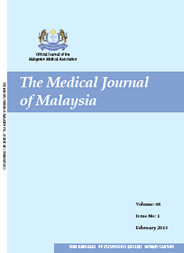MJM, Vol 70 Supplement 1 September 2015
Tribal dialects in Orang Asli maternal health promotion
- An innovative transformation
*Institute for Health Management, Kuala Lumpur, **Kuala Lipis District Health Office, Pahang, ***Hulu Perak District Health Office, Perak
ABSTRACT
Introduction: Orang Asli (OA) maternal mortality is a major health issues. According to the Confidential Enquiry of Maternal Death 2006-2008, the OA maternal mortality rate was 85.21/100,000 live births, which was approximately three times higher than the general population. Maternal education is crucial in ensuring expectant mothers receive appropriate advices during/post-pregnancy period. Findings from the phase 1 study showed that the unsafe delivery rate was high (17.2%). The level of knowledge on pregnancy-related diseases among the OA community is poor. To tackle these issues, we recruited local OA female volunteers as our liaison officers and utilised the special health education tools in our intervention program.
Methodology: The interventions were developed based on the findings from the phase 1 study. Due to the high illiteracy rate among the female OA in Kuala Lipis district, we used the specially developed health education video using the Temiar dialect. The video was narrated by the local OA health personnel and was used as a health education tool for pregnant mothers. In addition, OA user-friendly health education leaflets on the subjects of anaemia, diabetes and hypertension in pregnancy were translated into local OA dialects (Temiar, Semai and Temuan). The suitable leaflets will be distributed to the OA respondents based on the local dialects used at each relevant OA settlement study site. For both Hulu Perak and Kuala Lipis OA communities, we trained local OA female volunteers as the liaison officers in educating the local OA females on safe delivery, balanced diet and antenatal/postnatal care. The liaison officers were among those with experience in maternal health and influential individuals within the OA community.
Conclusion: Evaluation on the intervention will be done six-months post-intervention. Ideally, the interventions for the study should be evaluated at least 1-year post intervention to determine the efficacy of the intervention program.
Keywords: Orang Asli (native tribe), health innovation, local dialects
